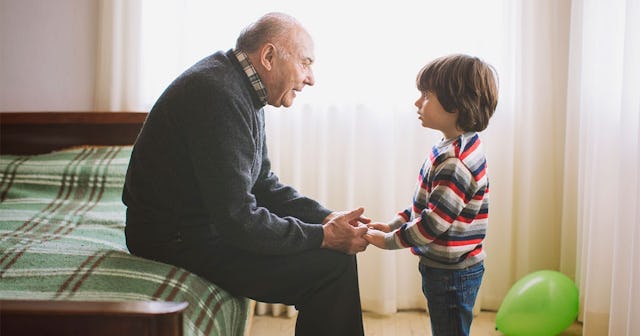Socialization Goes Far Beyond Same-Age Peer Interactions

The American Academy of Pediatrics (AAP), American Federation of Teachers (AFT), National Education Association (NEA) and AASA, the School Superintendents Association, issued a joint statement recently urging children to return to face-to-face school this fall— in part because they claim socialization is so important. They “learn social and emotional skills at school,” the statement says. With most children isolated at home with their parents for months on end, most folks are worried about socialization at this point. We want our kids around other kids as much as possible, and as soon as possible.
I get it. I hauled my kids 400 miles (with no breaks) to the beach to play with their similarly socially-isolated cousins. None of them had seen other children since March; everyone in the families had been completely quarantined since then. The kids were heartbreakingly glad to see another child’s face. We spent as long as we could at the beach house — not for the vacation, but for our kids to have playmates.
But there’s more to socialization than seeing other kids’ faces.
Socialization doesn’t only mean in-person experiences. It means learning the proper ways to behave in society. And if we send our kids to school too early, we’re teaching them an important lesson: the weak and the vulnerable— the old, the immunocompromised, the people with preexisting conditions— are not that important to us. Their health and lives are not important, but instead, disposable. In fact, the Texas Tribune reports that Texas Lt. Governor Dan Patrick told Tucker Carlson in March that, “No one reached out to me and said, ‘As a senior citizen, are you willing to take a chance on your survival in exchange for keeping the America that all America loves for your children and grandchildren?’ And if that’s the exchange, I’m all in… I just think there are lots of grandparents out there in this country like me.”
Let’s reopen and kill the old, the sick, and the vulnerable because the economy’s more important? WTF.
That’s Not Socialization
FrareDavis Photography/Getty
If socialization is learning to behave in a society, is that the lesson we want our kids to take into a post-isolation world? Gandhi said that “The true measure of any society can be found in how it treats its most vulnerable members.” That means the elderly to whom kids could spread the virus. That means the immunocompromised children and adults in our society. It means kids with asthma; it means teachers with preexisting conditions. By reopening schools too early, we teach kids that these people don’t matter. That their own comfort and happiness takes priority over anyone else’s.
Is money more valuable than people’s lives? Should we take the easier, more convenient option when the right one costs us more in money or time? Is selfishness the value we want them to learn from months of social isolation?
No way.
My husband and I decided a long time ago that it was most important for our children to walk into a post-isolation world knowing that they could rely on themselves, that they could make sacrifices to help others, that they were resourceful and kind and strong people. We decided not to worry about long division. They could catch up on that. They couldn’t catch up on the important lesson COVID-19 could teach them.
I do not want them to learn that Wall Street gains trump human lives. No pun intended.
No Socialization Still Sucks
Thomas Barwick/Getty
Yes, we’ve all made sacrifices during COVID. We’ve all lost the chance to see our friends. Why should our kids be exempt? In the 1940s, children were expected to isolate from peers during polio epidemics. Kids need to make sacrifices too. And they learn from those sacrifices. Kids learn that they aren’t the center of the universe. They learn that they, too, can make a difference in society. And if they can make a difference, they’re important. It boosts their sense of being part of a larger world, and in being part of a larger world, it boosts their self-esteem. They matter.
But what about only children? Yes. It’s worse on them, and it’s worse on their parents. Online interaction with other kids, even Zoom and FaceTime, can’t fill in all the gaps (though my oldest spent most of the day developing a version of D&D based on Star Wars and playing chess with a friend several states away). It’s heartbreaking when your kids cry about missing their friends.
Haven’t you broken down over the isolation you’ve felt during COVID?
Yes, we want to shield our children, to keep them as safe as possible from the big scary things in the world. We want them to have everything they need — and that means playing with other kids sometimes, whether you homeschool or do face-to-face, brick-and-mortar education. But our kids can learn from this experience. They can learn to make sacrifices and to value others in society more than themselves. Those pro-social values are becoming increasingly important in a digitally distanced world.
They need those values more than they need time with their peers. It sucks. It’s awful. It’s hard and it’s terrible. But in a time when everyone’s making such hard sacrifices, our kids need to know: they have to make sacrifices too. They have to help us protect the old and the sick. Their contributions are needed and important.
The sacrifices they’ve already made to stay home should be appreciated, valued, and continued if need be— not erased because of economic convenience. Yes, our kids have lost something. Yes, they continue to lose things. And yes, it’s hard. But they’re gaining something more valuable in the process. They’re learning to value others more than themselves.
That’s one lesson opening schools won’t teach them.
This article was originally published on